完全排斥液体的氟化涂层
Fluorinated coating is utterly repellent
by Mark Peplow, special to C&EN
一种透明的、有自愈能力的薄涂层能够抵抗包括浓酸与低表面张力溶剂在内的一百多种液体的侵蚀
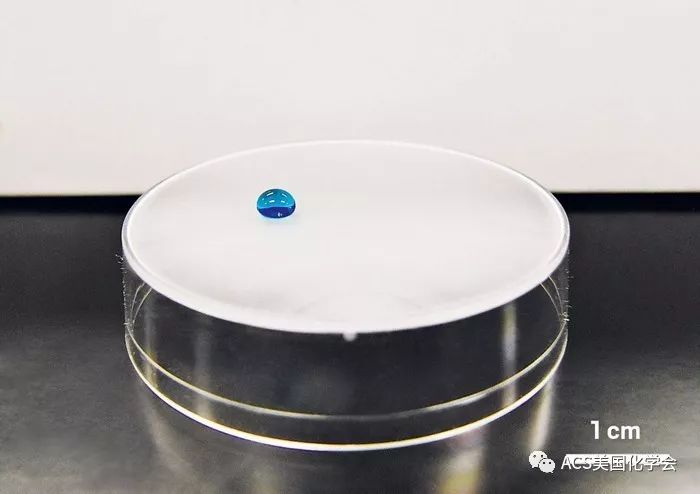
The new fluorinated coating protects a polystyrene petri dish from a droplet of the solvent tetrahydrofuran (colored blue). The solvent normally dissolves this plastic.
Credit: Nat. Mater.
有些防水涂层浸泡在水里时仍能够保持干燥,也有些涂层可以隔绝油以及有机溶剂。还有一些涂层则可以耐受严酷的环境,可应对强酸及高温,甚至在被破坏后能够自愈。
如今,研究人员创造了防护涂层领域名副其实的瑞士军刀。由于其独特的化学性能和质地,这种涂层在结合了以上提到的所有性质之外,还具有其他的性能(Nat.Mater。2018,DOI:10.1038/ s41563-018-0178-2)。“我们控制一系列不同的结构,从化学键到微观水平的纳米结构。”墨尔本大学的弗兰克卡鲁索(Frank Caruso)说道。他是这个超级全能材料研发团队的研究人员之一。
上面提到的涂层是一种包含了1H,1H,2H,2H-全氟己基三氯硅烷(PFTS)和氰基丙烯酸正丁酯(n-BCA)的混合物,在二氯五氟丙烷溶液中混合。当其被喷涂于表面时,空气中的水蒸气会引发PFTS和n-BCA之间的一系列聚合反应,形成坚韧、透明的薄膜。该薄膜涂层含有聚合物纳米粒子,会聚合并形成具有良好质地的涂层面,而这些涂层面可以捕获微小的空气形成的气泡隔层,以起到阻拦液体的作用。
在测试中,该涂层可以阻隔包括水、正戊烷、全氟己烷和浓氢氟酸在内的100多种不同的液体。液滴通常在涂层上形成似球形的水珠,并与图层面形成至少150度的接触角。拥有这种接触角数值的涂层通常会被认为具有“超防液性”。略微倾斜表面– 通常小于5度– 便足够使液滴干脆利落地从涂层表面滚离。当正戊烷(一种具有非常低的表面张力并且会弄湿大多数表面的化合物)被喷到该涂层上面时,涂层表面能够轻易地将其弹落。
A jet of pentane bounces right off this stainless steel mesh, thanks to its super-repellent coating. This solvent will wet most surfaces.
Credit: Nat. Mater.
研究人员表示,n-BCA可作为一种强力粘合剂,将上述涂料固定在包括木材、金属、玻璃和涤纶织物在内的各种材料上。卡鲁索认为,这种强粘合力还可以降低涂层逃逸到环境中的风险,而这一问题一直困扰着其他多氟化合物的应用。
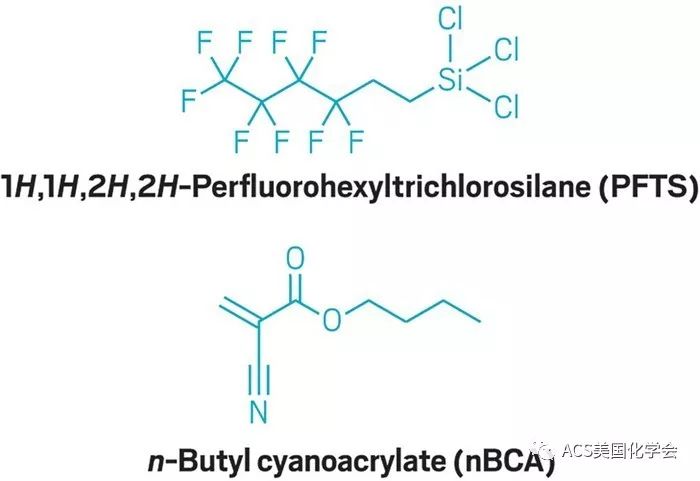
该涂层在100℃也能继续排斥液体,并在刮擦、研磨和洗涤后保持其性能。只有当研究人员用氧等离子体冲刷它时,该涂层才会失去其防液性。即便如此,该材料也能在受到上述处理后,在室温下24小时后自愈,或者在120°C时于10分钟内恢复。也就是说,当该涂层中的聚合物链重组时,该涂层会重获其先前所有的超能力。
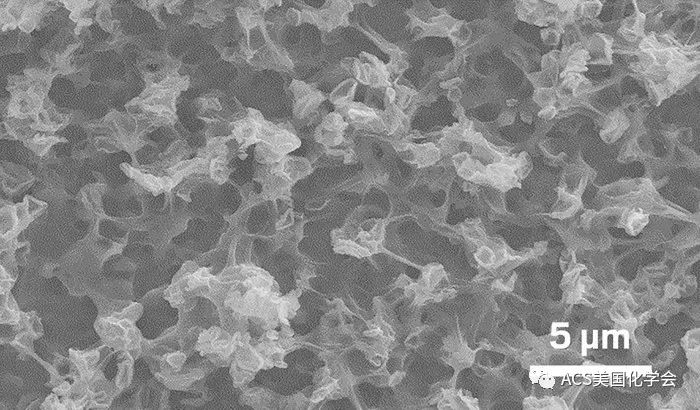
The microscopic structure of the new fluorinated coating may help to create a cushion of air that improves its repellent properties.
Credit: Nat. Mater.
来自马克斯×普朗克聚合物研究所、研究超级防液涂层的Doris Vollmer表示,许多上述提到的超级防液性能已经被融入到了以前发明出来的材料中。但是这次的涂层对正戊烷的排斥能力是不寻常的,因为该涂层能在自我修复后完全恢复对正戊烷液体的抵抗性。“这比我见过的其他涂料更好。”她说。
杜勒姆大学开发功能表面材料的Jas Pal S. Badyal说,这种涂料简单的喷涂方法,也能使其在商业应用上更具吸引力。“这种一步到位的(喷涂)方法很好。”他说。然而,使用二氯五氟丙烷作为涂料前体的溶剂,可能成为商业推广中的绊脚石,因为这些卤化物对环境有负面影响。
A drop of pentane falls onto a piece of fabric with a super-repellent coating.
Credit: Nat. Mater.
Caruso建议,这种材料最终可以开发成用于屏蔽化学危害的涂层,并且该团队已经开始与工业伙伴合作。“但这种材料在应用方面仍有很长的路要走。”他补充说,并指出研究人员需要降低涂层成本并评估其长期耐用度。
Transparent, self-healing film fends off more than 100 liquids, including concentrated acids and low-surface-tension solvents
Some liquid-repelling coatings stay dry in a deluge of water, while others rebuff oils and organic solvents. Some can withstand harsh treatment, shrugging off harsh acids, high temperatures, or even healing themselves after being damaged.
Now researchers have created a veritable Swiss Army knife of a repellent coating that combines all of these properties and more, thanks to its unique chemistry and texture (Nat. Mater. 2018, DOI: 10.1038/s41563-018-0178-2). “We’re controlling a range of different structures, from the chemical bond to the nanoscale to the microscopic level,” says Frank Caruso of the University of Melbourne, part of the team behind the super-omniphobic material.
The coating is a mixture of 1H,1H,2H,2H-perfluorohexyltrichlorosilane (PFTS) and n-butyl cyanoacrylate (n-BCA), combined in a dichloropentafluoropropane solution. When sprayed onto a surface, water vapor in the atmosphere triggers a series of polymerization reactions between PFTS and n-BCA to create a tough, transparent film. The coating contains polymer nanoparticles that aggregate to form a highly textured surface, which may trap tiny pockets of air to help ward off liquids.
In tests, the coating repelled more than 100 different liquids, including water, n-pentane, perfluorohexane, and concentrated hydrofluoric acid. Droplets of liquid typically formed almost spherical globules on the coating, with contact angles of at least 150 degrees—generally regarded as the mark of a super-repellent surface. Slightly tilting a surface—typically less than 5 degrees—was enough to make the droplets roll off cleanly. A jet of n-pentane, which has a very low surface tension and will wet most surfaces, simply bounced off coated surfaces.
The reserchers say that n-BCA acts as a powerful adhesive to anchor the coating to a wide range of substances, including wood, metal, glass and polyester fabric. Caruso suggests that this strong adhesion may also reduce the risk of the coating escaping into the environment, a problem that has bedeviled other polyfluorinated compounds.
The coating continued to repel liquids at 100 °C and retained its properties after scratching, abrading, and washing. Only when the researchers scoured it with oxygen plasma did it lose its repellency. Even then, the material healed itself after 24 hours at room temperature, or in just 10 minutes if heated to 120 °C, regaining its full complement of super powers as its polymer chains reorganized themselves.
Many of these properties have been combined in previous materials, says Doris Vollmer at the Max Planck Institute for Polymer Research, who studies super-repellent coatings. But the coating’s ability to repel n-pentane is unusual, as is the complete recovery of n-pentane repellency after self-healing. “That is better than I’ve seen with other coatings,” she says.
The simple, spray-on method could also make this coating attractive for commercial applications, says Jas Pal S. Badyal, who develops functional surfaces at Durham University. “The one-step approach is good,” he says. However, using dichloropentafluoropropane as a solvent for the coating’s precursors could be a stumbling block, he adds, due to the environmental impact of such halogenated compounds.
Caruso suggests that the material could eventually be developed into a coating for chemical hazard shielding, and the team is already working with industry partners. “But there’s still a long way to go in terms of applications,” he adds, noting that they need to reduce the cost of the coating and assess its long-term durability.
This article is reproduced with permission from Chemical & Engineering News (© American Chemical Society). The article was first published on OCTOBER 16, 2018 | APPEARED IN VOLUME 96, ISSUE 42.
更多纳米防水资讯请关注纳米防水微信号: nanowp

随着电子产品防水需求的不断提高,从原先的 IP54到现在的IP67IP68等级!市场上出现了防水透气膜和防水透音膜,目前这两种不同的材料应用被搞混了,今天便与大家一起讨论防水透气
最近各地降雨量激增,所以手机就难免会沾点水,作为生活中不可或缺的电子产品,防水已经成为一个十分重要重要功能,而且个人对目前的IP68手机市场是相当不满意的。为什么?太贵
自然界中荷叶具有出淤泥而不染的典型不沾水特性(学术上称为Cassie-Baxter状态),具有自清洁、抗结冰、减阻、抗腐蚀等广泛应用价值,而玫瑰花瓣则具有水滴高粘附特性(称为Wenze
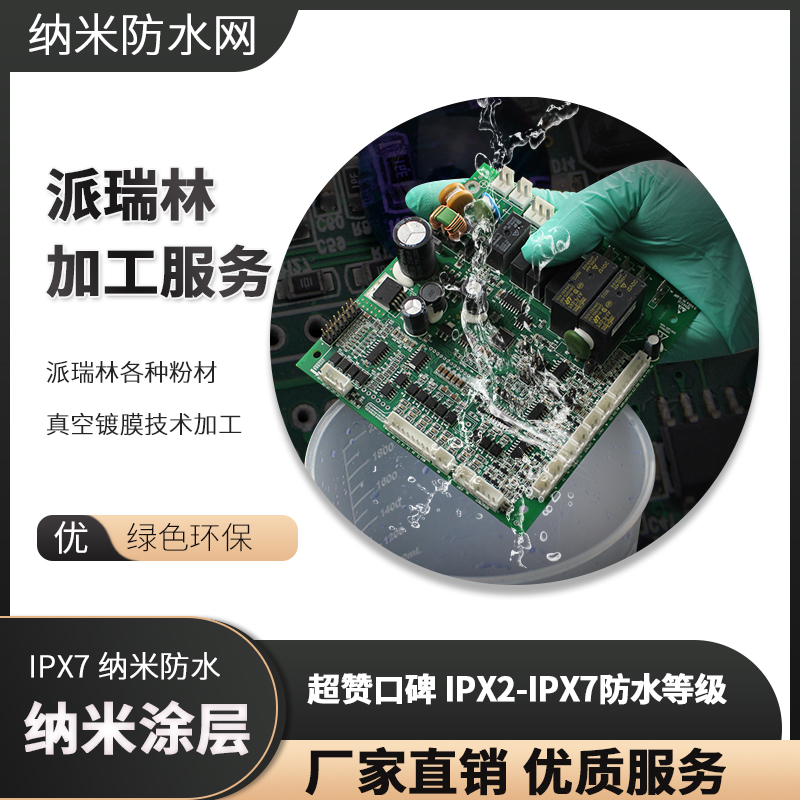
派瑞林各种粉材真空镀膜技术加工 纳米涂层防水处理
派瑞林各种粉材真空镀膜技术加工 纳米涂层防水处理
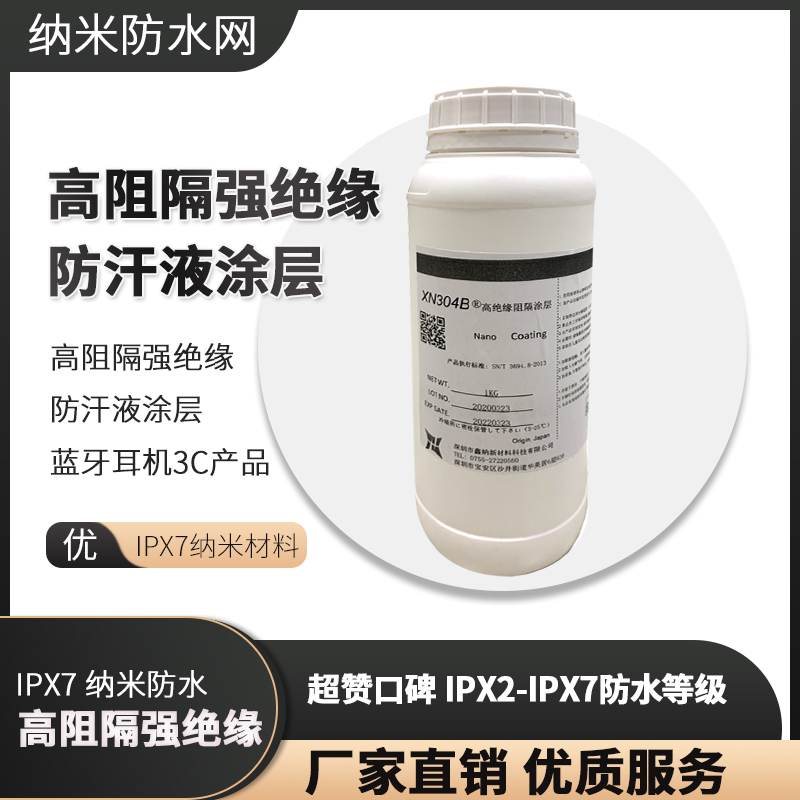
高阻隔强绝缘防汗液涂层蓝牙耳机3C电子产品IPX7纳米材料
高阻隔强绝缘防汗液涂层蓝牙耳机3C电子产品IPX7纳米材料
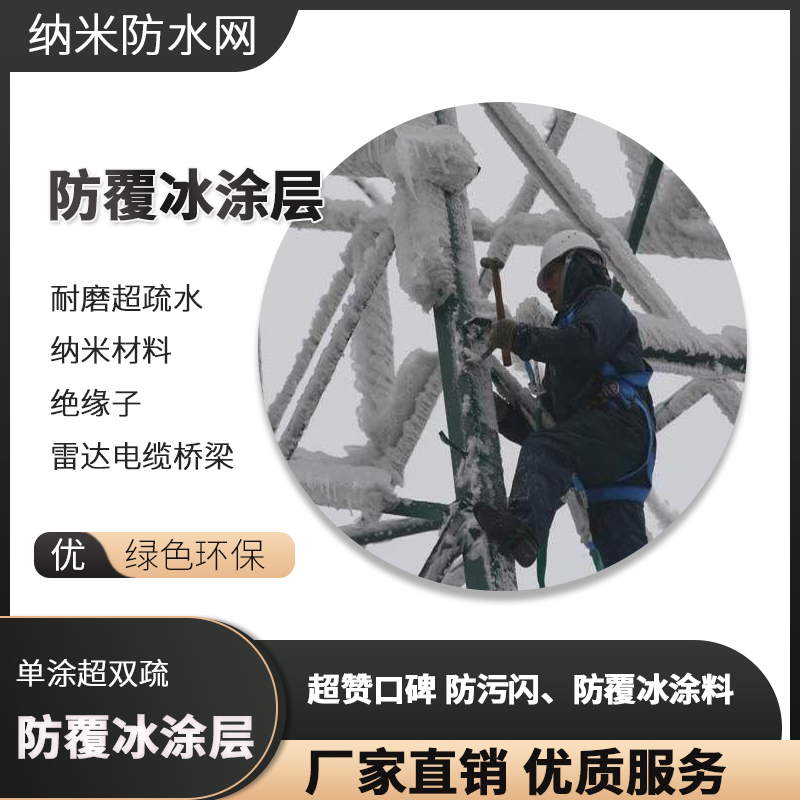
耐磨超疏水纳米材料 绝缘子架空导线电缆桥梁防覆冰涂层
耐磨超疏水纳米材料 绝缘子架空导线电缆桥梁防覆冰涂层
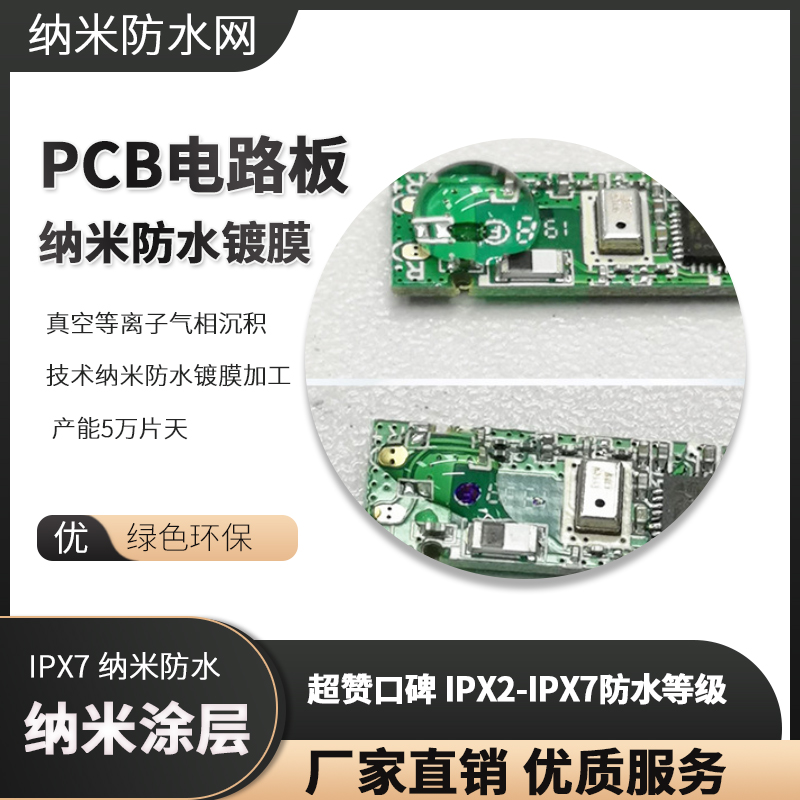
真空等离子气相沉积技术纳米防水镀膜加工 产能5万片天
真空等离子气相沉积技术纳米防水镀膜加工 产能5万片天
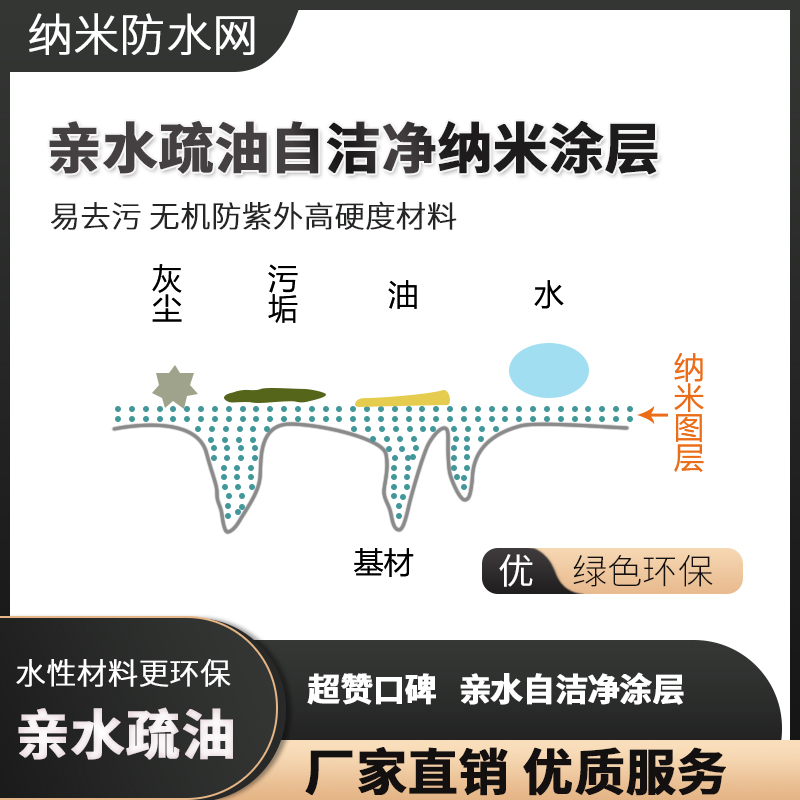
亲水疏油自洁净纳米涂层 易去污 无机防紫外高硬度材料
亲水疏油自洁净纳米涂层 易去污 无机防紫外高硬度材料
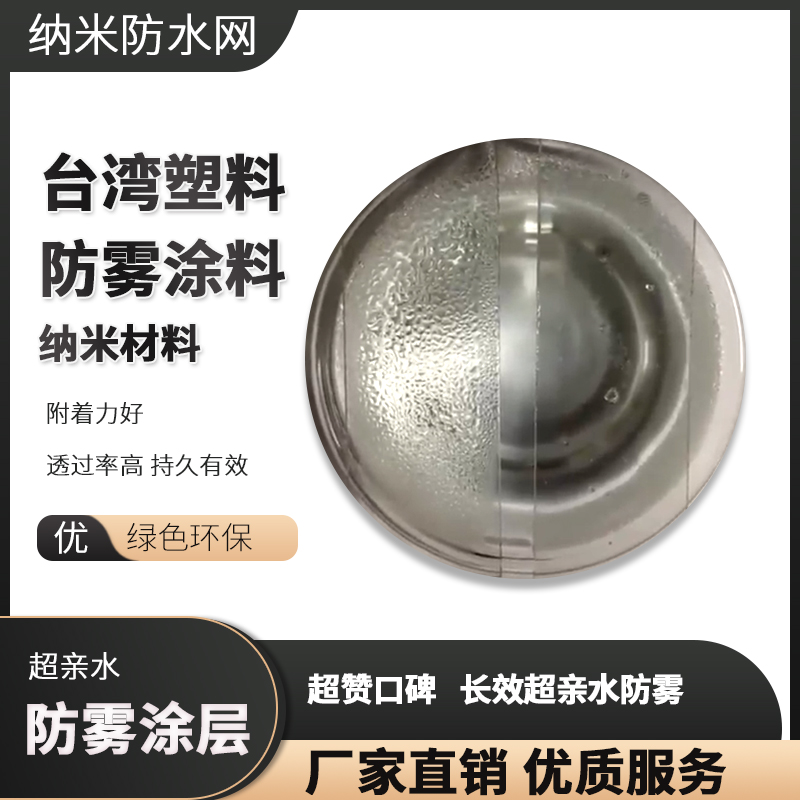
台湾超亲水防雾塑料专用 附着力好 透过率高 持久有效
台湾超亲水防雾塑料专用 附着力好 透过率高 持久有效


